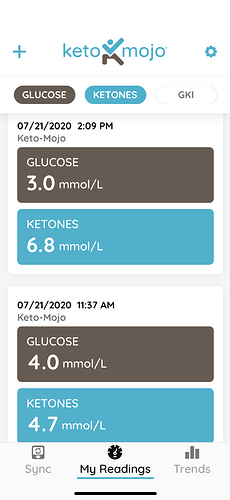I had seen a very low GKI of 1.0 in the past very rarely.
About 2 weeks back, it tightened up on IF and carbs in an effort to lose a few pounds if put back on.
After about a week, I took my reading before the big meal (last meal of the day) and had 3.0 glucose and 6.8 ketone so 0.44 GKI. Felt great …
Continuing the same eating pattern I am seeing both variables slowly creeping the other direction with averages about 4.5g - 3.8k and 1.1 - 1.2 GKI
3 month average for me is 5.0g - 2.0 g and 2.5 GKI
Does the ketone production normalize with the diet to “needed levels” ?
Ps my activity level is fairly sedentary (3000 steps) until the weekend then varies with maybe 7500 steps per day average.
Thanks ,


